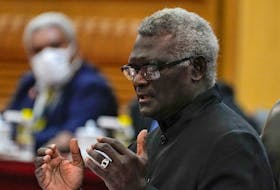The only place rural Islanders will have their voices heard is in court, says a group opposing the Municipal Government Act (MGA).
Following the announcement of the Island Regulatory and Appeals Commission’s (IRAC) recommendation to amalgamate the Three Rivers area, which was approved by cabinet, members of the Coalition of Rural Islanders said Tuesday they plan to take the province to court to show the MGA is unconstitutional.
While his own community of Martinvale was excluded from amalgamation, coalition chairman Gary Robbins said the MGA is discriminatory to unincorporated Islanders.
“It’s got to be re-written from the start,” said Robbins, who said discussions of amalgamation were forced through new requirements in the MGA. “We’ll go forward with whatever it takes… if we go through the legal channels and still don’t win, it will be up to the people to get rid of this government.”
The group believes the act was unconstitutional because those living in municipalities had a voice through plebiscites and elected councils, while unincorporated Islanders had no official say on annexation.
“Why shouldn’t I have the same rights as those living in municipalities,” said Robbins.
Related: P.E.I. government amalgamates Three Rivers, North Shore and Central Prince
In its report, IRAC noted there was no involvement from unincorporated residents during mediation held between Montague, Georgetown and the other five communities.
However, the commission stated mediator Frank Gillan took unincorporated concerns into account.
Along with recommending that new tax rates be kept to a minimum for unincorporated residents, Gillan also recommended those residents receive a tax holiday until they start receiving new municipal services.
“The commission is therefore confident that, although the unincorporated areas were not present at the mediation table, their concerns were considered by the mediator in crafting his proposal,” stated the commission.
Robbins said a binding plebiscite should have been held for unincorporated residents, noting a majority of unincorporated residents voted against being involved in the proposal during a privately sponsored vote.
In its report, IRAC stated it received 1,511 objections, although noted that many of those were from individuals who did not live in the affected area or whose address could not be verified.
In total, 371 objections were received from residents of the communities while 197 were received from unincorporated residents.
The communities that saw the most objections came from Summerside at 211 and Freetown at 120, neither of which are included in the proposal.
Robbins said he has heard from Islanders across the province, which strengthens the coalition’s position.
“If people across the whole Island are against it, why would they still go ahead with it,” said Robbins.
Coalition member Sylvia Teasdale said it felt like amalgamation was being “pushed through” for the municipal elections this November and that IRAC’s decision was no surprise.
“We were prepared for it and we know the only place we can meet them is in court,” said Teasdale. “The (MGA) is not illegal (now) because the act was passed by legislature. What we’re saying is it is unconstitutional, and when we challenge it and win, and it’s determined to be unconstitutional, then it becomes illegal.
“They know they’re on legal thin ice, but they’ve got our money to play with and they’ve got a lot of it.”
The commission noted it was previously contacted by legal counsel for the “Rural Coalition of P.E.I.” but requests for further information went unanswered.








